Research Plan on Ethical Considerations While Managing Failed Projects
VerifiedAdded on 2020/01/16
|14
|4229
|364
Report
AI Summary
This report presents a comprehensive research plan focused on the ethical considerations involved in managing failed projects. The research addresses the problem statement by identifying ethical issues that arise in the process. The plan outlines research questions concerning ethical considerations, integrity, and professional obligations. The methodology includes an exploratory research approach and a post-positivist philosophy. The literature review covers ethical issues in project management, professional obligations, integrity, conflict of interest, acting professionally, relationships, confidentiality, responsibility, and cultural differences. The expected findings aim to provide new guidelines and strategies for ethical implementation. The plan includes a detailed methodology section, covering research philosophy, design, approach, data collection, and analysis. This research aims to contribute to the understanding and management of ethical challenges in project failure scenarios.
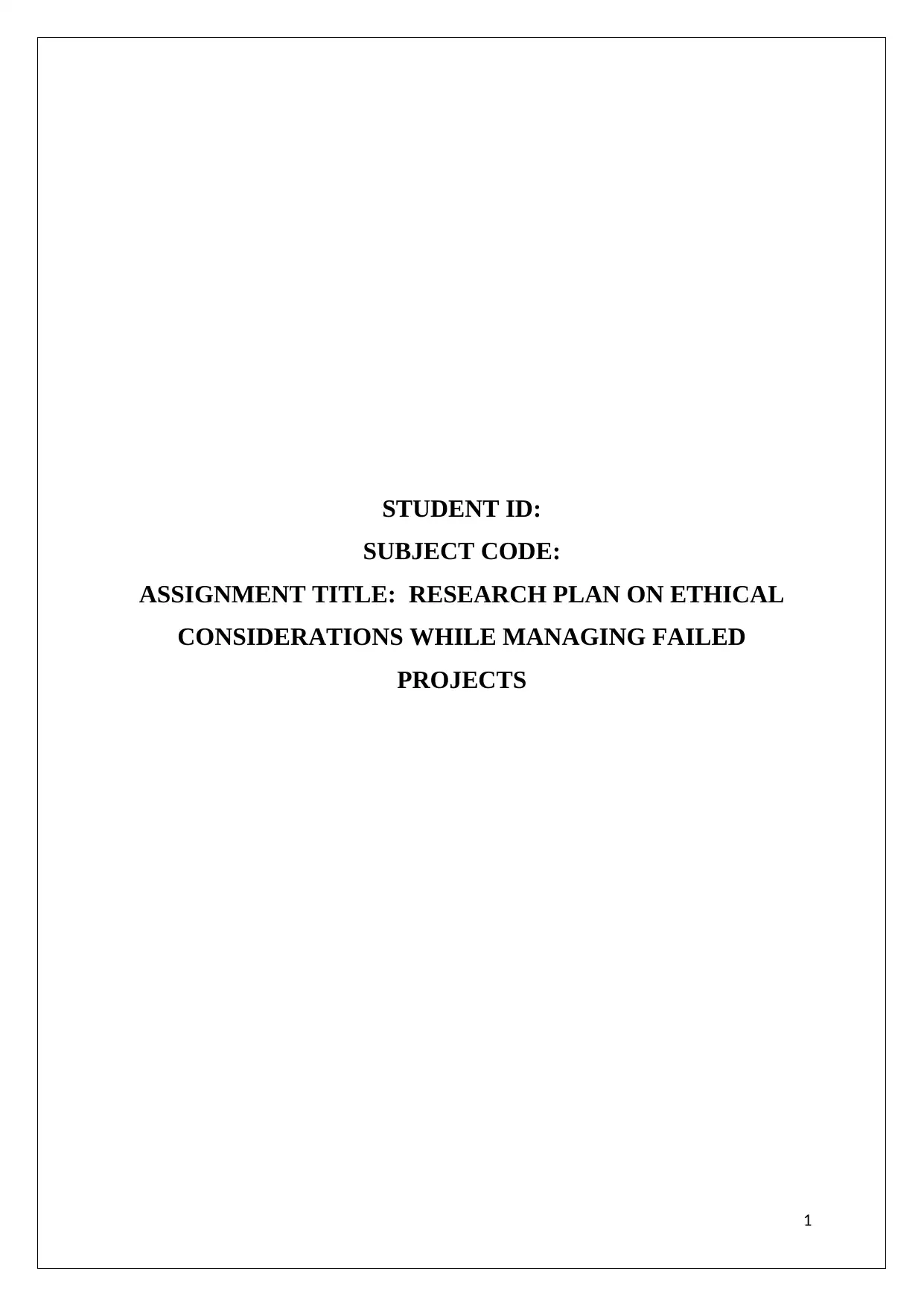
STUDENT ID:
SUBJECT CODE:
ASSIGNMENT TITLE: RESEARCH PLAN ON ETHICAL
CONSIDERATIONS WHILE MANAGING FAILED
PROJECTS
1
SUBJECT CODE:
ASSIGNMENT TITLE: RESEARCH PLAN ON ETHICAL
CONSIDERATIONS WHILE MANAGING FAILED
PROJECTS
1
Paraphrase This Document
Need a fresh take? Get an instant paraphrase of this document with our AI Paraphraser
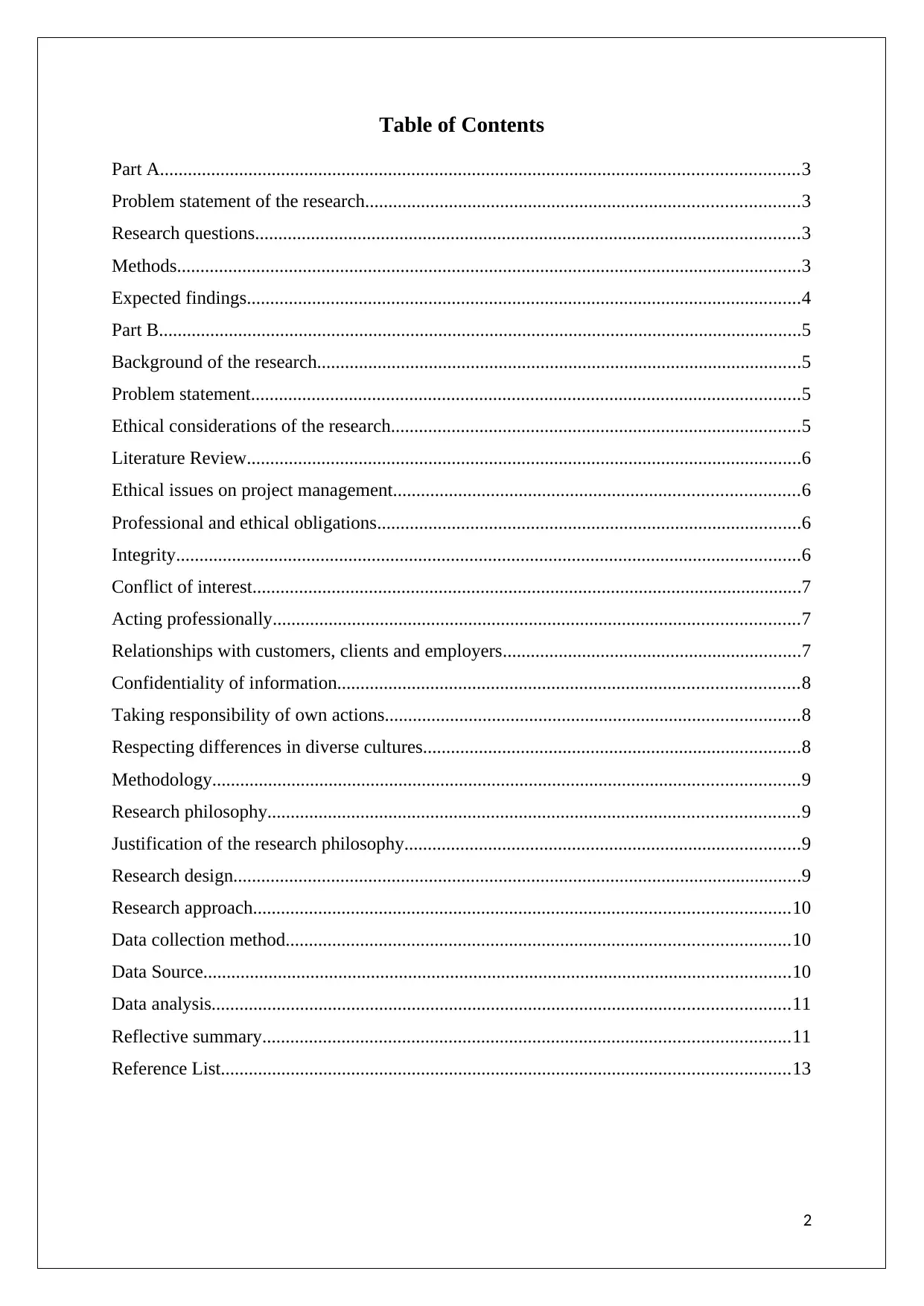
Table of Contents
Part A.........................................................................................................................................3
Problem statement of the research.............................................................................................3
Research questions.....................................................................................................................3
Methods......................................................................................................................................3
Expected findings.......................................................................................................................4
Part B..........................................................................................................................................5
Background of the research........................................................................................................5
Problem statement......................................................................................................................5
Ethical considerations of the research........................................................................................5
Literature Review.......................................................................................................................6
Ethical issues on project management.......................................................................................6
Professional and ethical obligations...........................................................................................6
Integrity......................................................................................................................................6
Conflict of interest......................................................................................................................7
Acting professionally.................................................................................................................7
Relationships with customers, clients and employers................................................................7
Confidentiality of information...................................................................................................8
Taking responsibility of own actions.........................................................................................8
Respecting differences in diverse cultures.................................................................................8
Methodology..............................................................................................................................9
Research philosophy..................................................................................................................9
Justification of the research philosophy.....................................................................................9
Research design..........................................................................................................................9
Research approach...................................................................................................................10
Data collection method............................................................................................................10
Data Source..............................................................................................................................10
Data analysis............................................................................................................................11
Reflective summary.................................................................................................................11
Reference List..........................................................................................................................13
2
Part A.........................................................................................................................................3
Problem statement of the research.............................................................................................3
Research questions.....................................................................................................................3
Methods......................................................................................................................................3
Expected findings.......................................................................................................................4
Part B..........................................................................................................................................5
Background of the research........................................................................................................5
Problem statement......................................................................................................................5
Ethical considerations of the research........................................................................................5
Literature Review.......................................................................................................................6
Ethical issues on project management.......................................................................................6
Professional and ethical obligations...........................................................................................6
Integrity......................................................................................................................................6
Conflict of interest......................................................................................................................7
Acting professionally.................................................................................................................7
Relationships with customers, clients and employers................................................................7
Confidentiality of information...................................................................................................8
Taking responsibility of own actions.........................................................................................8
Respecting differences in diverse cultures.................................................................................8
Methodology..............................................................................................................................9
Research philosophy..................................................................................................................9
Justification of the research philosophy.....................................................................................9
Research design..........................................................................................................................9
Research approach...................................................................................................................10
Data collection method............................................................................................................10
Data Source..............................................................................................................................10
Data analysis............................................................................................................................11
Reflective summary.................................................................................................................11
Reference List..........................................................................................................................13
2
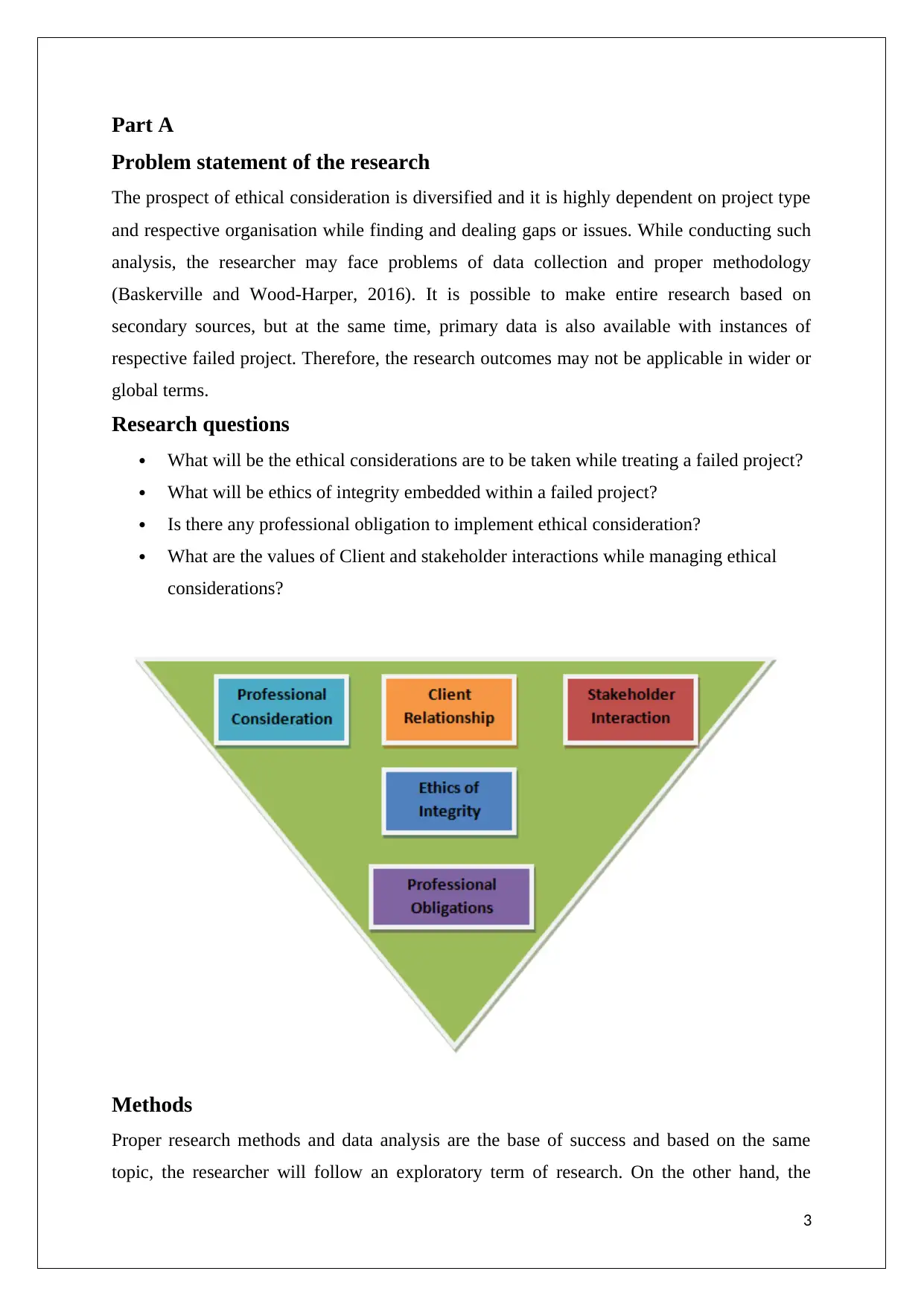
Part A
Problem statement of the research
The prospect of ethical consideration is diversified and it is highly dependent on project type
and respective organisation while finding and dealing gaps or issues. While conducting such
analysis, the researcher may face problems of data collection and proper methodology
(Baskerville and Wood-Harper, 2016). It is possible to make entire research based on
secondary sources, but at the same time, primary data is also available with instances of
respective failed project. Therefore, the research outcomes may not be applicable in wider or
global terms.
Research questions
What will be the ethical considerations are to be taken while treating a failed project?
What will be ethics of integrity embedded within a failed project?
Is there any professional obligation to implement ethical consideration?
What are the values of Client and stakeholder interactions while managing ethical
considerations?
Methods
Proper research methods and data analysis are the base of success and based on the same
topic, the researcher will follow an exploratory term of research. On the other hand, the
3
Problem statement of the research
The prospect of ethical consideration is diversified and it is highly dependent on project type
and respective organisation while finding and dealing gaps or issues. While conducting such
analysis, the researcher may face problems of data collection and proper methodology
(Baskerville and Wood-Harper, 2016). It is possible to make entire research based on
secondary sources, but at the same time, primary data is also available with instances of
respective failed project. Therefore, the research outcomes may not be applicable in wider or
global terms.
Research questions
What will be the ethical considerations are to be taken while treating a failed project?
What will be ethics of integrity embedded within a failed project?
Is there any professional obligation to implement ethical consideration?
What are the values of Client and stakeholder interactions while managing ethical
considerations?
Methods
Proper research methods and data analysis are the base of success and based on the same
topic, the researcher will follow an exploratory term of research. On the other hand, the
3
⊘ This is a preview!⊘
Do you want full access?
Subscribe today to unlock all pages.

Trusted by 1+ million students worldwide
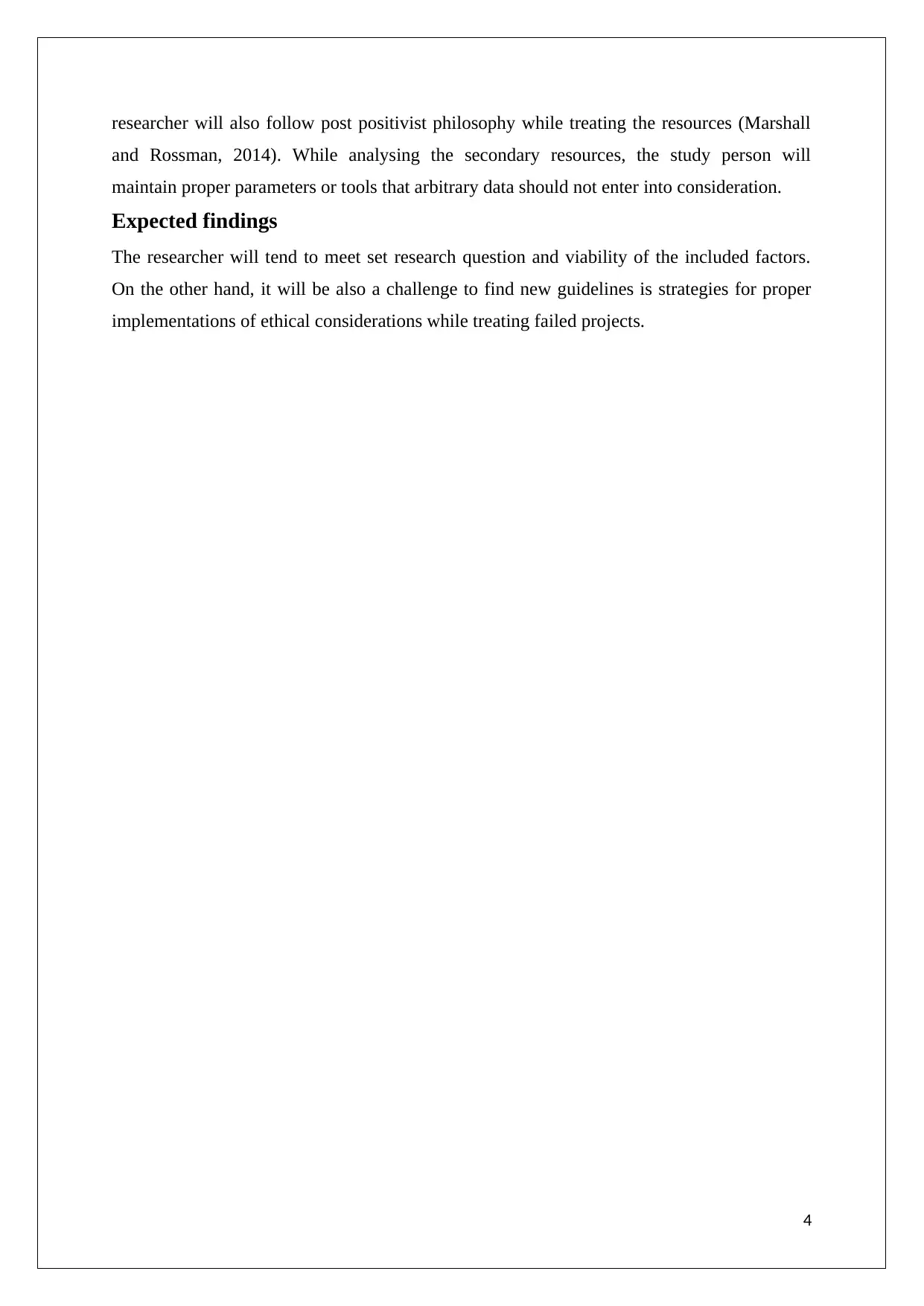
researcher will also follow post positivist philosophy while treating the resources (Marshall
and Rossman, 2014). While analysing the secondary resources, the study person will
maintain proper parameters or tools that arbitrary data should not enter into consideration.
Expected findings
The researcher will tend to meet set research question and viability of the included factors.
On the other hand, it will be also a challenge to find new guidelines is strategies for proper
implementations of ethical considerations while treating failed projects.
4
and Rossman, 2014). While analysing the secondary resources, the study person will
maintain proper parameters or tools that arbitrary data should not enter into consideration.
Expected findings
The researcher will tend to meet set research question and viability of the included factors.
On the other hand, it will be also a challenge to find new guidelines is strategies for proper
implementations of ethical considerations while treating failed projects.
4
Paraphrase This Document
Need a fresh take? Get an instant paraphrase of this document with our AI Paraphraser
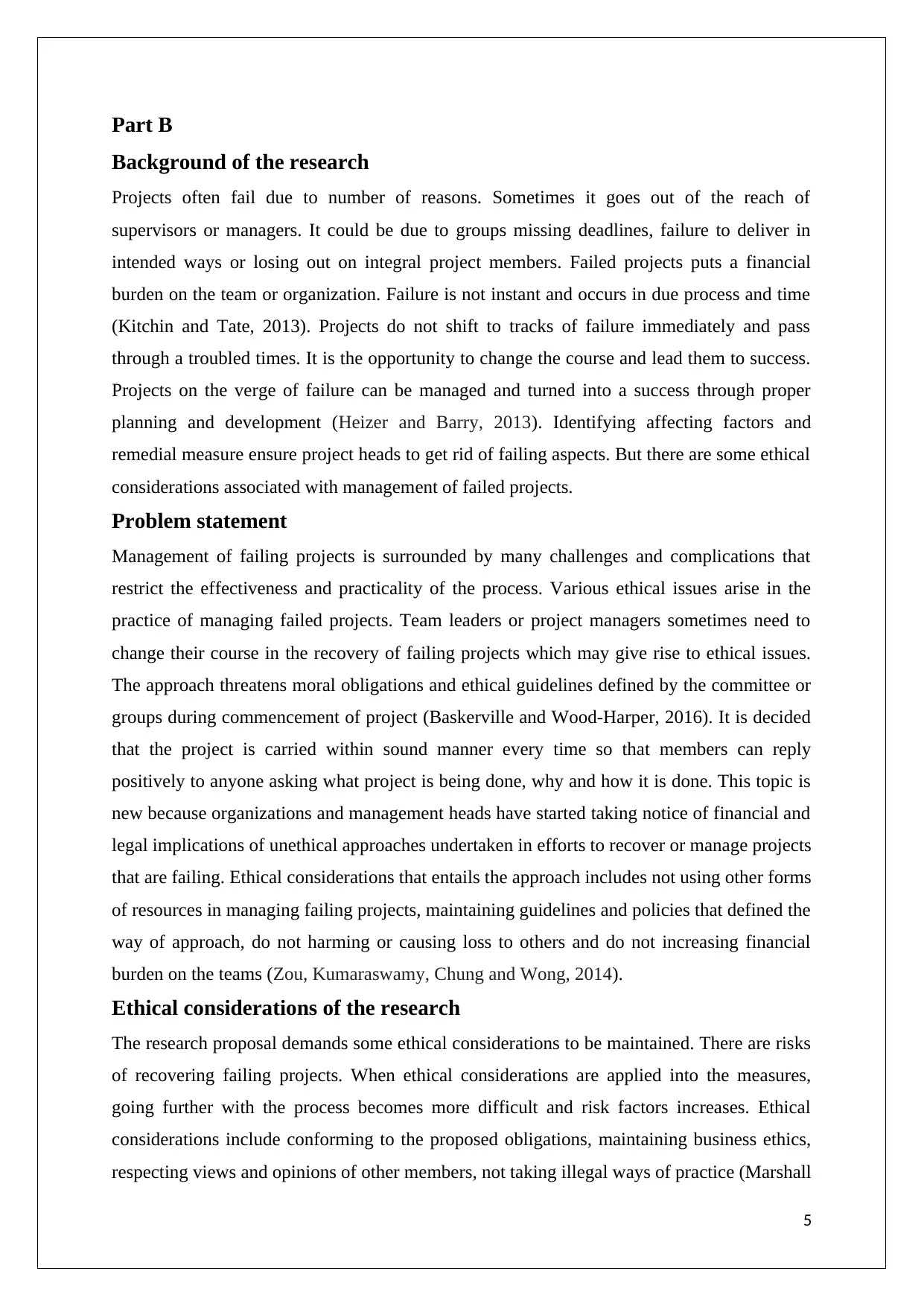
Part B
Background of the research
Projects often fail due to number of reasons. Sometimes it goes out of the reach of
supervisors or managers. It could be due to groups missing deadlines, failure to deliver in
intended ways or losing out on integral project members. Failed projects puts a financial
burden on the team or organization. Failure is not instant and occurs in due process and time
(Kitchin and Tate, 2013). Projects do not shift to tracks of failure immediately and pass
through a troubled times. It is the opportunity to change the course and lead them to success.
Projects on the verge of failure can be managed and turned into a success through proper
planning and development (Heizer and Barry, 2013). Identifying affecting factors and
remedial measure ensure project heads to get rid of failing aspects. But there are some ethical
considerations associated with management of failed projects.
Problem statement
Management of failing projects is surrounded by many challenges and complications that
restrict the effectiveness and practicality of the process. Various ethical issues arise in the
practice of managing failed projects. Team leaders or project managers sometimes need to
change their course in the recovery of failing projects which may give rise to ethical issues.
The approach threatens moral obligations and ethical guidelines defined by the committee or
groups during commencement of project (Baskerville and Wood-Harper, 2016). It is decided
that the project is carried within sound manner every time so that members can reply
positively to anyone asking what project is being done, why and how it is done. This topic is
new because organizations and management heads have started taking notice of financial and
legal implications of unethical approaches undertaken in efforts to recover or manage projects
that are failing. Ethical considerations that entails the approach includes not using other forms
of resources in managing failing projects, maintaining guidelines and policies that defined the
way of approach, do not harming or causing loss to others and do not increasing financial
burden on the teams (Zou, Kumaraswamy, Chung and Wong, 2014).
Ethical considerations of the research
The research proposal demands some ethical considerations to be maintained. There are risks
of recovering failing projects. When ethical considerations are applied into the measures,
going further with the process becomes more difficult and risk factors increases. Ethical
considerations include conforming to the proposed obligations, maintaining business ethics,
respecting views and opinions of other members, not taking illegal ways of practice (Marshall
5
Background of the research
Projects often fail due to number of reasons. Sometimes it goes out of the reach of
supervisors or managers. It could be due to groups missing deadlines, failure to deliver in
intended ways or losing out on integral project members. Failed projects puts a financial
burden on the team or organization. Failure is not instant and occurs in due process and time
(Kitchin and Tate, 2013). Projects do not shift to tracks of failure immediately and pass
through a troubled times. It is the opportunity to change the course and lead them to success.
Projects on the verge of failure can be managed and turned into a success through proper
planning and development (Heizer and Barry, 2013). Identifying affecting factors and
remedial measure ensure project heads to get rid of failing aspects. But there are some ethical
considerations associated with management of failed projects.
Problem statement
Management of failing projects is surrounded by many challenges and complications that
restrict the effectiveness and practicality of the process. Various ethical issues arise in the
practice of managing failed projects. Team leaders or project managers sometimes need to
change their course in the recovery of failing projects which may give rise to ethical issues.
The approach threatens moral obligations and ethical guidelines defined by the committee or
groups during commencement of project (Baskerville and Wood-Harper, 2016). It is decided
that the project is carried within sound manner every time so that members can reply
positively to anyone asking what project is being done, why and how it is done. This topic is
new because organizations and management heads have started taking notice of financial and
legal implications of unethical approaches undertaken in efforts to recover or manage projects
that are failing. Ethical considerations that entails the approach includes not using other forms
of resources in managing failing projects, maintaining guidelines and policies that defined the
way of approach, do not harming or causing loss to others and do not increasing financial
burden on the teams (Zou, Kumaraswamy, Chung and Wong, 2014).
Ethical considerations of the research
The research proposal demands some ethical considerations to be maintained. There are risks
of recovering failing projects. When ethical considerations are applied into the measures,
going further with the process becomes more difficult and risk factors increases. Ethical
considerations include conforming to the proposed obligations, maintaining business ethics,
respecting views and opinions of other members, not taking illegal ways of practice (Marshall
5
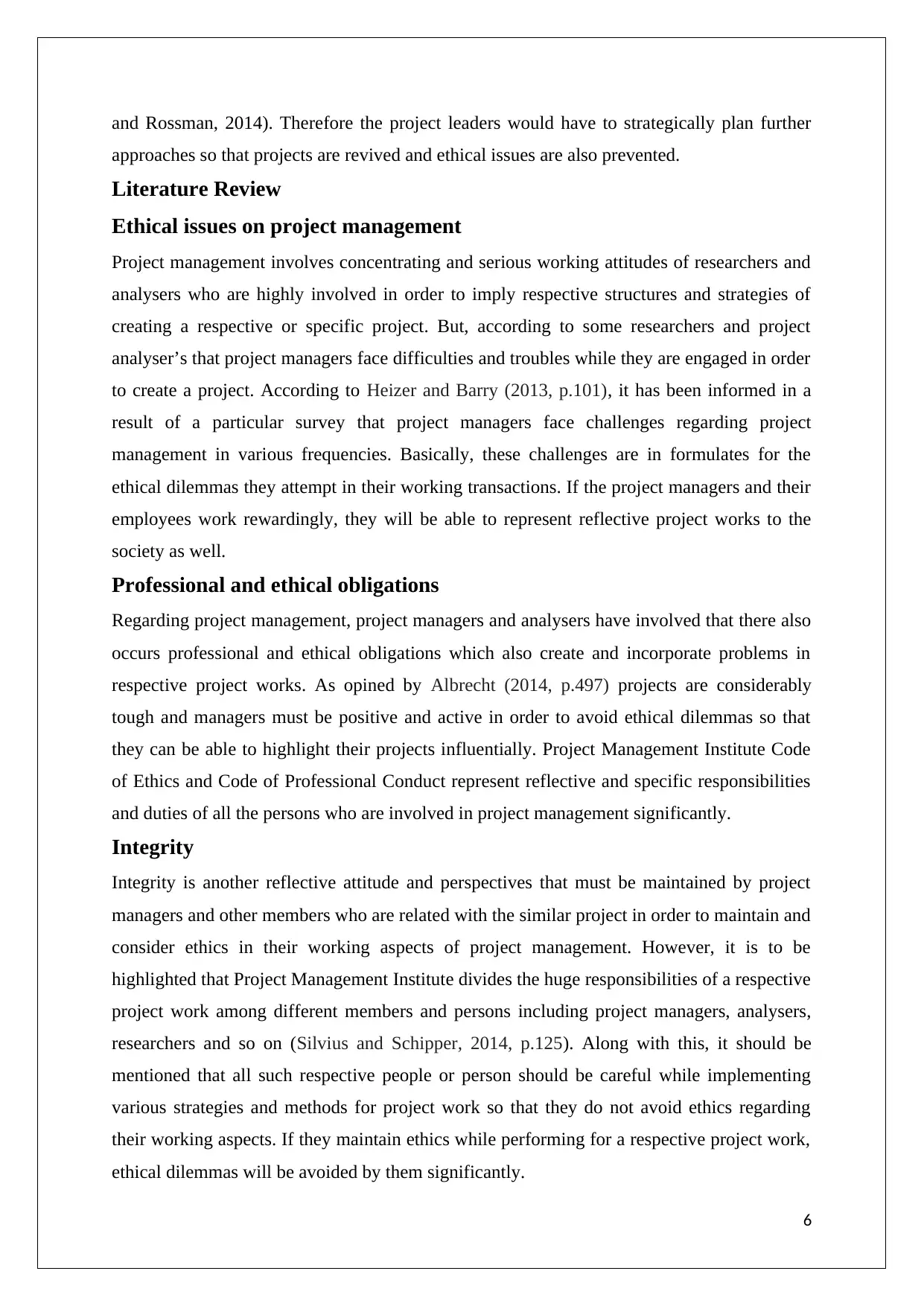
and Rossman, 2014). Therefore the project leaders would have to strategically plan further
approaches so that projects are revived and ethical issues are also prevented.
Literature Review
Ethical issues on project management
Project management involves concentrating and serious working attitudes of researchers and
analysers who are highly involved in order to imply respective structures and strategies of
creating a respective or specific project. But, according to some researchers and project
analyser’s that project managers face difficulties and troubles while they are engaged in order
to create a project. According to Heizer and Barry (2013, p.101), it has been informed in a
result of a particular survey that project managers face challenges regarding project
management in various frequencies. Basically, these challenges are in formulates for the
ethical dilemmas they attempt in their working transactions. If the project managers and their
employees work rewardingly, they will be able to represent reflective project works to the
society as well.
Professional and ethical obligations
Regarding project management, project managers and analysers have involved that there also
occurs professional and ethical obligations which also create and incorporate problems in
respective project works. As opined by Albrecht (2014, p.497) projects are considerably
tough and managers must be positive and active in order to avoid ethical dilemmas so that
they can be able to highlight their projects influentially. Project Management Institute Code
of Ethics and Code of Professional Conduct represent reflective and specific responsibilities
and duties of all the persons who are involved in project management significantly.
Integrity
Integrity is another reflective attitude and perspectives that must be maintained by project
managers and other members who are related with the similar project in order to maintain and
consider ethics in their working aspects of project management. However, it is to be
highlighted that Project Management Institute divides the huge responsibilities of a respective
project work among different members and persons including project managers, analysers,
researchers and so on (Silvius and Schipper, 2014, p.125). Along with this, it should be
mentioned that all such respective people or person should be careful while implementing
various strategies and methods for project work so that they do not avoid ethics regarding
their working aspects. If they maintain ethics while performing for a respective project work,
ethical dilemmas will be avoided by them significantly.
6
approaches so that projects are revived and ethical issues are also prevented.
Literature Review
Ethical issues on project management
Project management involves concentrating and serious working attitudes of researchers and
analysers who are highly involved in order to imply respective structures and strategies of
creating a respective or specific project. But, according to some researchers and project
analyser’s that project managers face difficulties and troubles while they are engaged in order
to create a project. According to Heizer and Barry (2013, p.101), it has been informed in a
result of a particular survey that project managers face challenges regarding project
management in various frequencies. Basically, these challenges are in formulates for the
ethical dilemmas they attempt in their working transactions. If the project managers and their
employees work rewardingly, they will be able to represent reflective project works to the
society as well.
Professional and ethical obligations
Regarding project management, project managers and analysers have involved that there also
occurs professional and ethical obligations which also create and incorporate problems in
respective project works. As opined by Albrecht (2014, p.497) projects are considerably
tough and managers must be positive and active in order to avoid ethical dilemmas so that
they can be able to highlight their projects influentially. Project Management Institute Code
of Ethics and Code of Professional Conduct represent reflective and specific responsibilities
and duties of all the persons who are involved in project management significantly.
Integrity
Integrity is another reflective attitude and perspectives that must be maintained by project
managers and other members who are related with the similar project in order to maintain and
consider ethics in their working aspects of project management. However, it is to be
highlighted that Project Management Institute divides the huge responsibilities of a respective
project work among different members and persons including project managers, analysers,
researchers and so on (Silvius and Schipper, 2014, p.125). Along with this, it should be
mentioned that all such respective people or person should be careful while implementing
various strategies and methods for project work so that they do not avoid ethics regarding
their working aspects. If they maintain ethics while performing for a respective project work,
ethical dilemmas will be avoided by them significantly.
6
⊘ This is a preview!⊘
Do you want full access?
Subscribe today to unlock all pages.

Trusted by 1+ million students worldwide
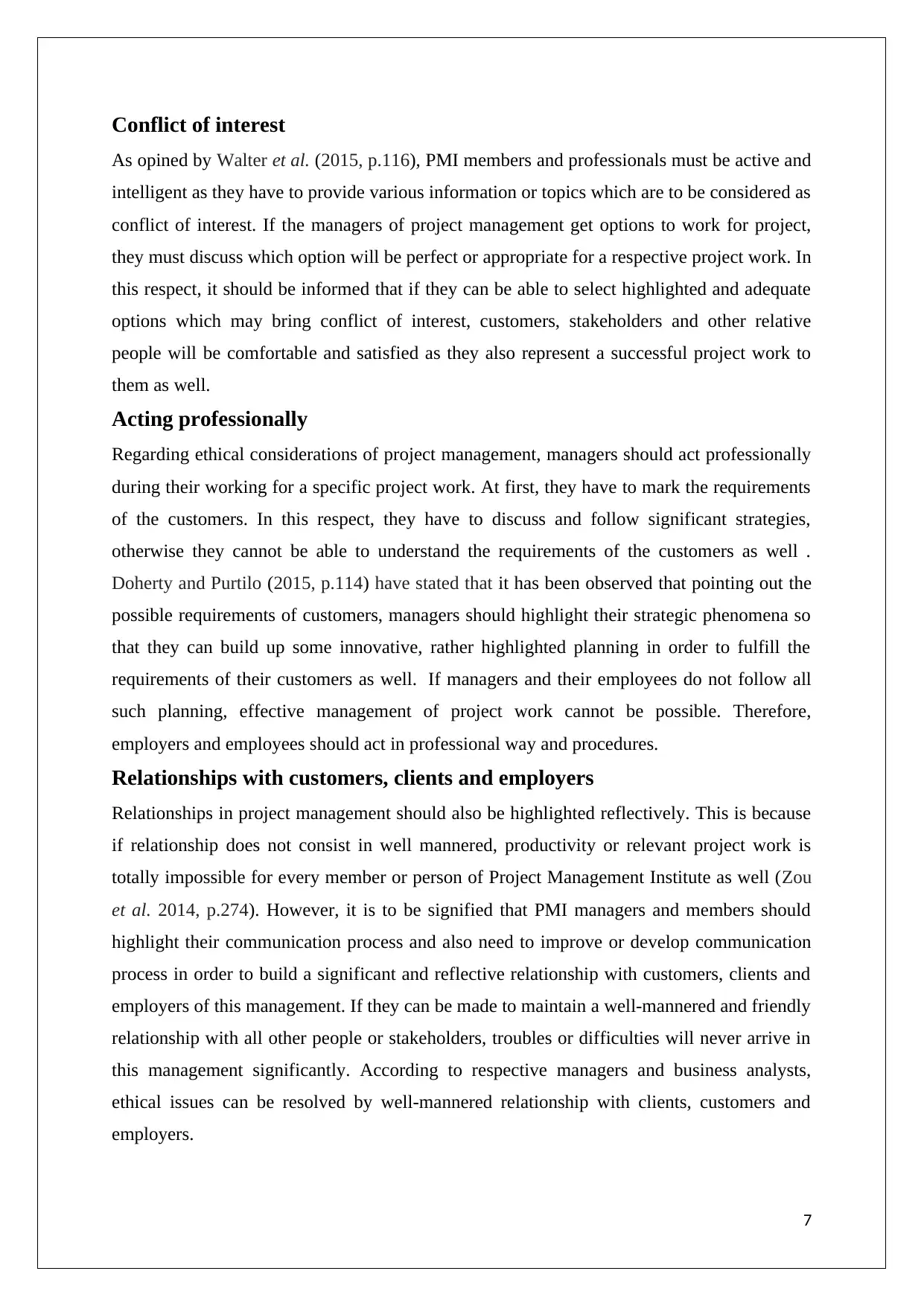
Conflict of interest
As opined by Walter et al. (2015, p.116), PMI members and professionals must be active and
intelligent as they have to provide various information or topics which are to be considered as
conflict of interest. If the managers of project management get options to work for project,
they must discuss which option will be perfect or appropriate for a respective project work. In
this respect, it should be informed that if they can be able to select highlighted and adequate
options which may bring conflict of interest, customers, stakeholders and other relative
people will be comfortable and satisfied as they also represent a successful project work to
them as well.
Acting professionally
Regarding ethical considerations of project management, managers should act professionally
during their working for a specific project work. At first, they have to mark the requirements
of the customers. In this respect, they have to discuss and follow significant strategies,
otherwise they cannot be able to understand the requirements of the customers as well .
Doherty and Purtilo (2015, p.114) have stated that it has been observed that pointing out the
possible requirements of customers, managers should highlight their strategic phenomena so
that they can build up some innovative, rather highlighted planning in order to fulfill the
requirements of their customers as well. If managers and their employees do not follow all
such planning, effective management of project work cannot be possible. Therefore,
employers and employees should act in professional way and procedures.
Relationships with customers, clients and employers
Relationships in project management should also be highlighted reflectively. This is because
if relationship does not consist in well mannered, productivity or relevant project work is
totally impossible for every member or person of Project Management Institute as well (Zou
et al. 2014, p.274). However, it is to be signified that PMI managers and members should
highlight their communication process and also need to improve or develop communication
process in order to build a significant and reflective relationship with customers, clients and
employers of this management. If they can be made to maintain a well-mannered and friendly
relationship with all other people or stakeholders, troubles or difficulties will never arrive in
this management significantly. According to respective managers and business analysts,
ethical issues can be resolved by well-mannered relationship with clients, customers and
employers.
7
As opined by Walter et al. (2015, p.116), PMI members and professionals must be active and
intelligent as they have to provide various information or topics which are to be considered as
conflict of interest. If the managers of project management get options to work for project,
they must discuss which option will be perfect or appropriate for a respective project work. In
this respect, it should be informed that if they can be able to select highlighted and adequate
options which may bring conflict of interest, customers, stakeholders and other relative
people will be comfortable and satisfied as they also represent a successful project work to
them as well.
Acting professionally
Regarding ethical considerations of project management, managers should act professionally
during their working for a specific project work. At first, they have to mark the requirements
of the customers. In this respect, they have to discuss and follow significant strategies,
otherwise they cannot be able to understand the requirements of the customers as well .
Doherty and Purtilo (2015, p.114) have stated that it has been observed that pointing out the
possible requirements of customers, managers should highlight their strategic phenomena so
that they can build up some innovative, rather highlighted planning in order to fulfill the
requirements of their customers as well. If managers and their employees do not follow all
such planning, effective management of project work cannot be possible. Therefore,
employers and employees should act in professional way and procedures.
Relationships with customers, clients and employers
Relationships in project management should also be highlighted reflectively. This is because
if relationship does not consist in well mannered, productivity or relevant project work is
totally impossible for every member or person of Project Management Institute as well (Zou
et al. 2014, p.274). However, it is to be signified that PMI managers and members should
highlight their communication process and also need to improve or develop communication
process in order to build a significant and reflective relationship with customers, clients and
employers of this management. If they can be made to maintain a well-mannered and friendly
relationship with all other people or stakeholders, troubles or difficulties will never arrive in
this management significantly. According to respective managers and business analysts,
ethical issues can be resolved by well-mannered relationship with clients, customers and
employers.
7
Paraphrase This Document
Need a fresh take? Get an instant paraphrase of this document with our AI Paraphraser
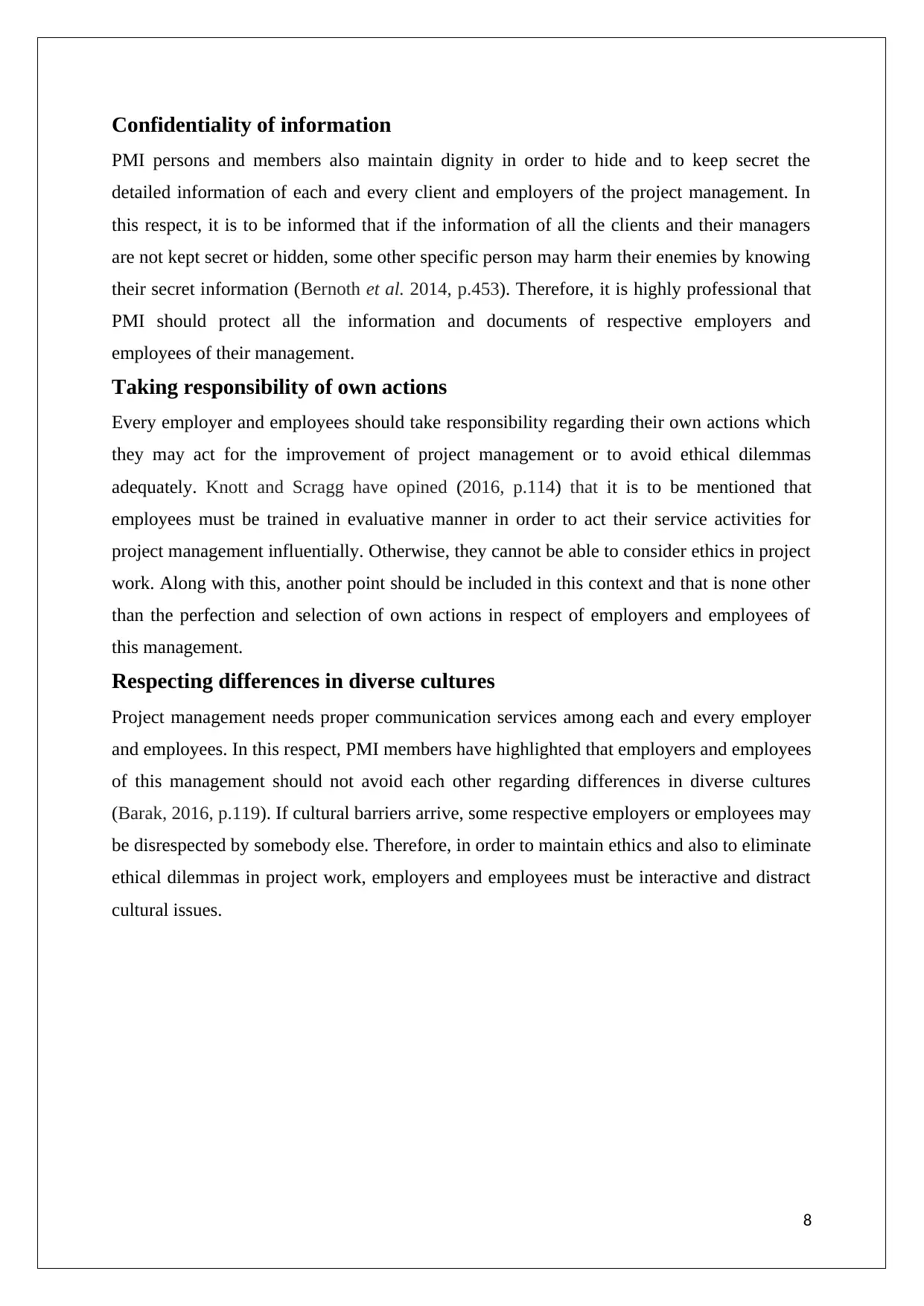
Confidentiality of information
PMI persons and members also maintain dignity in order to hide and to keep secret the
detailed information of each and every client and employers of the project management. In
this respect, it is to be informed that if the information of all the clients and their managers
are not kept secret or hidden, some other specific person may harm their enemies by knowing
their secret information (Bernoth et al. 2014, p.453). Therefore, it is highly professional that
PMI should protect all the information and documents of respective employers and
employees of their management.
Taking responsibility of own actions
Every employer and employees should take responsibility regarding their own actions which
they may act for the improvement of project management or to avoid ethical dilemmas
adequately. Knott and Scragg have opined (2016, p.114) that it is to be mentioned that
employees must be trained in evaluative manner in order to act their service activities for
project management influentially. Otherwise, they cannot be able to consider ethics in project
work. Along with this, another point should be included in this context and that is none other
than the perfection and selection of own actions in respect of employers and employees of
this management.
Respecting differences in diverse cultures
Project management needs proper communication services among each and every employer
and employees. In this respect, PMI members have highlighted that employers and employees
of this management should not avoid each other regarding differences in diverse cultures
(Barak, 2016, p.119). If cultural barriers arrive, some respective employers or employees may
be disrespected by somebody else. Therefore, in order to maintain ethics and also to eliminate
ethical dilemmas in project work, employers and employees must be interactive and distract
cultural issues.
8
PMI persons and members also maintain dignity in order to hide and to keep secret the
detailed information of each and every client and employers of the project management. In
this respect, it is to be informed that if the information of all the clients and their managers
are not kept secret or hidden, some other specific person may harm their enemies by knowing
their secret information (Bernoth et al. 2014, p.453). Therefore, it is highly professional that
PMI should protect all the information and documents of respective employers and
employees of their management.
Taking responsibility of own actions
Every employer and employees should take responsibility regarding their own actions which
they may act for the improvement of project management or to avoid ethical dilemmas
adequately. Knott and Scragg have opined (2016, p.114) that it is to be mentioned that
employees must be trained in evaluative manner in order to act their service activities for
project management influentially. Otherwise, they cannot be able to consider ethics in project
work. Along with this, another point should be included in this context and that is none other
than the perfection and selection of own actions in respect of employers and employees of
this management.
Respecting differences in diverse cultures
Project management needs proper communication services among each and every employer
and employees. In this respect, PMI members have highlighted that employers and employees
of this management should not avoid each other regarding differences in diverse cultures
(Barak, 2016, p.119). If cultural barriers arrive, some respective employers or employees may
be disrespected by somebody else. Therefore, in order to maintain ethics and also to eliminate
ethical dilemmas in project work, employers and employees must be interactive and distract
cultural issues.
8
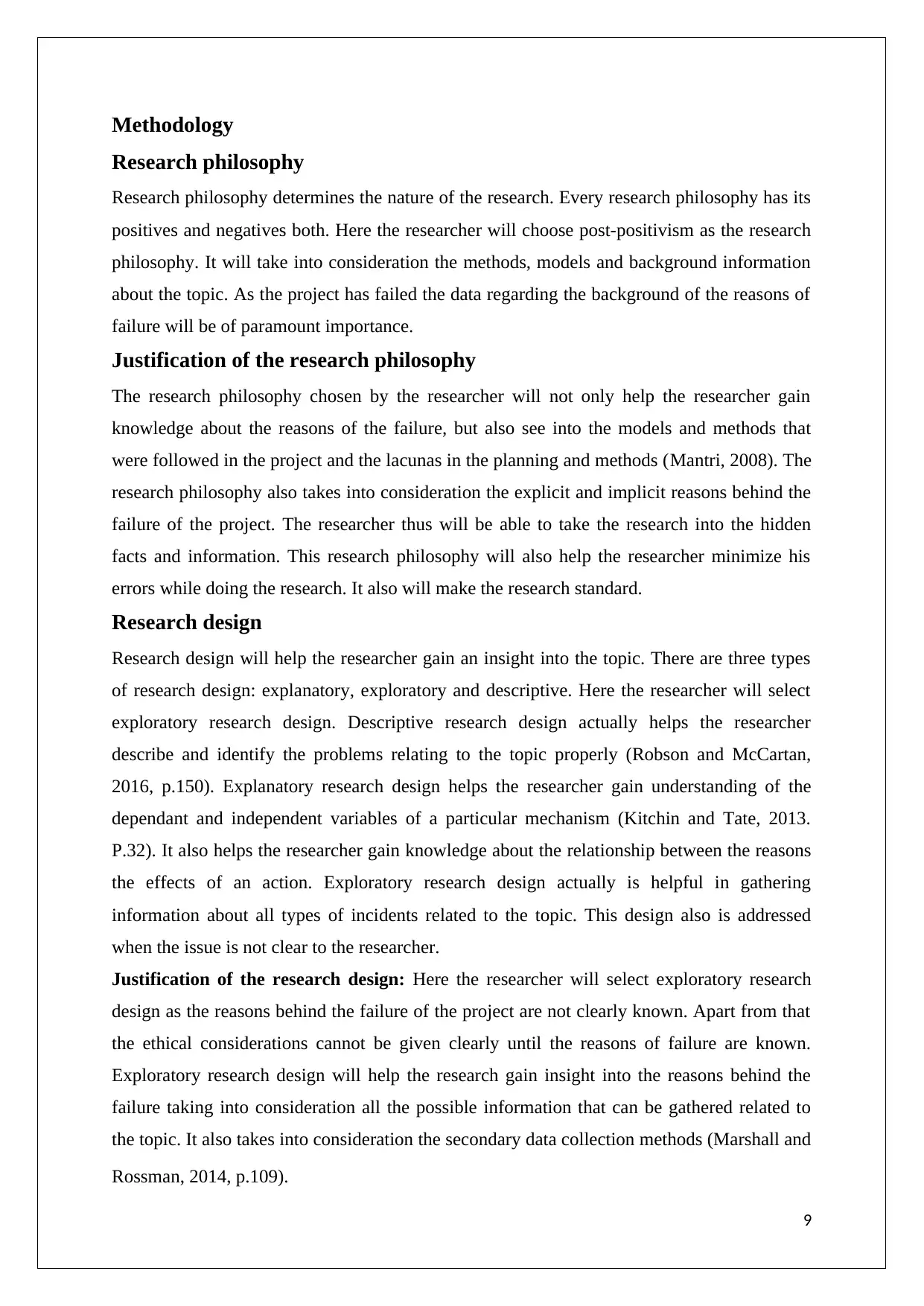
Methodology
Research philosophy
Research philosophy determines the nature of the research. Every research philosophy has its
positives and negatives both. Here the researcher will choose post-positivism as the research
philosophy. It will take into consideration the methods, models and background information
about the topic. As the project has failed the data regarding the background of the reasons of
failure will be of paramount importance.
Justification of the research philosophy
The research philosophy chosen by the researcher will not only help the researcher gain
knowledge about the reasons of the failure, but also see into the models and methods that
were followed in the project and the lacunas in the planning and methods (Mantri, 2008). The
research philosophy also takes into consideration the explicit and implicit reasons behind the
failure of the project. The researcher thus will be able to take the research into the hidden
facts and information. This research philosophy will also help the researcher minimize his
errors while doing the research. It also will make the research standard.
Research design
Research design will help the researcher gain an insight into the topic. There are three types
of research design: explanatory, exploratory and descriptive. Here the researcher will select
exploratory research design. Descriptive research design actually helps the researcher
describe and identify the problems relating to the topic properly (Robson and McCartan,
2016, p.150). Explanatory research design helps the researcher gain understanding of the
dependant and independent variables of a particular mechanism (Kitchin and Tate, 2013.
P.32). It also helps the researcher gain knowledge about the relationship between the reasons
the effects of an action. Exploratory research design actually is helpful in gathering
information about all types of incidents related to the topic. This design also is addressed
when the issue is not clear to the researcher.
Justification of the research design: Here the researcher will select exploratory research
design as the reasons behind the failure of the project are not clearly known. Apart from that
the ethical considerations cannot be given clearly until the reasons of failure are known.
Exploratory research design will help the research gain insight into the reasons behind the
failure taking into consideration all the possible information that can be gathered related to
the topic. It also takes into consideration the secondary data collection methods (Marshall and
Rossman, 2014, p.109).
9
Research philosophy
Research philosophy determines the nature of the research. Every research philosophy has its
positives and negatives both. Here the researcher will choose post-positivism as the research
philosophy. It will take into consideration the methods, models and background information
about the topic. As the project has failed the data regarding the background of the reasons of
failure will be of paramount importance.
Justification of the research philosophy
The research philosophy chosen by the researcher will not only help the researcher gain
knowledge about the reasons of the failure, but also see into the models and methods that
were followed in the project and the lacunas in the planning and methods (Mantri, 2008). The
research philosophy also takes into consideration the explicit and implicit reasons behind the
failure of the project. The researcher thus will be able to take the research into the hidden
facts and information. This research philosophy will also help the researcher minimize his
errors while doing the research. It also will make the research standard.
Research design
Research design will help the researcher gain an insight into the topic. There are three types
of research design: explanatory, exploratory and descriptive. Here the researcher will select
exploratory research design. Descriptive research design actually helps the researcher
describe and identify the problems relating to the topic properly (Robson and McCartan,
2016, p.150). Explanatory research design helps the researcher gain understanding of the
dependant and independent variables of a particular mechanism (Kitchin and Tate, 2013.
P.32). It also helps the researcher gain knowledge about the relationship between the reasons
the effects of an action. Exploratory research design actually is helpful in gathering
information about all types of incidents related to the topic. This design also is addressed
when the issue is not clear to the researcher.
Justification of the research design: Here the researcher will select exploratory research
design as the reasons behind the failure of the project are not clearly known. Apart from that
the ethical considerations cannot be given clearly until the reasons of failure are known.
Exploratory research design will help the research gain insight into the reasons behind the
failure taking into consideration all the possible information that can be gathered related to
the topic. It also takes into consideration the secondary data collection methods (Marshall and
Rossman, 2014, p.109).
9
⊘ This is a preview!⊘
Do you want full access?
Subscribe today to unlock all pages.

Trusted by 1+ million students worldwide
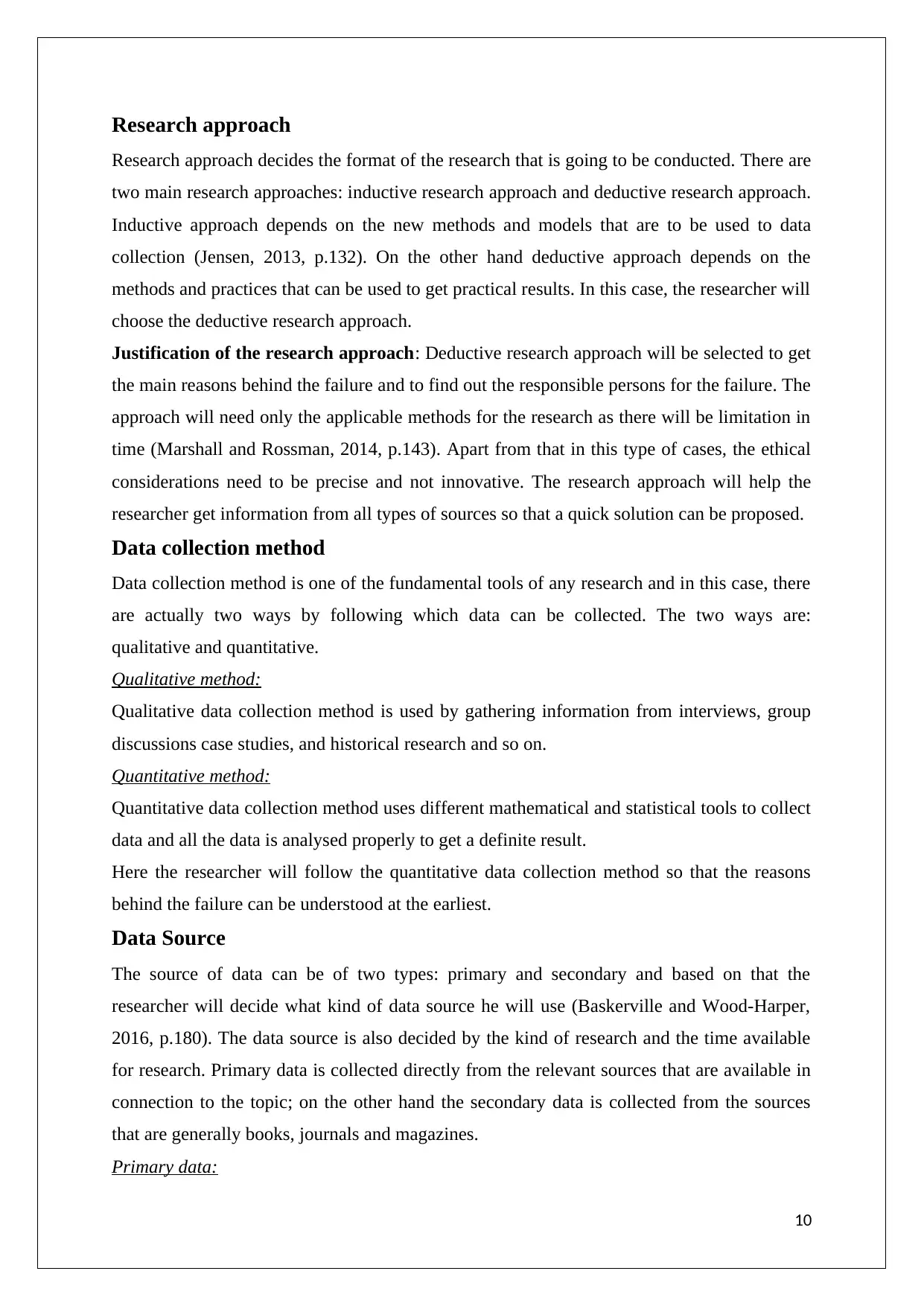
Research approach
Research approach decides the format of the research that is going to be conducted. There are
two main research approaches: inductive research approach and deductive research approach.
Inductive approach depends on the new methods and models that are to be used to data
collection (Jensen, 2013, p.132). On the other hand deductive approach depends on the
methods and practices that can be used to get practical results. In this case, the researcher will
choose the deductive research approach.
Justification of the research approach: Deductive research approach will be selected to get
the main reasons behind the failure and to find out the responsible persons for the failure. The
approach will need only the applicable methods for the research as there will be limitation in
time (Marshall and Rossman, 2014, p.143). Apart from that in this type of cases, the ethical
considerations need to be precise and not innovative. The research approach will help the
researcher get information from all types of sources so that a quick solution can be proposed.
Data collection method
Data collection method is one of the fundamental tools of any research and in this case, there
are actually two ways by following which data can be collected. The two ways are:
qualitative and quantitative.
Qualitative method:
Qualitative data collection method is used by gathering information from interviews, group
discussions case studies, and historical research and so on.
Quantitative method:
Quantitative data collection method uses different mathematical and statistical tools to collect
data and all the data is analysed properly to get a definite result.
Here the researcher will follow the quantitative data collection method so that the reasons
behind the failure can be understood at the earliest.
Data Source
The source of data can be of two types: primary and secondary and based on that the
researcher will decide what kind of data source he will use (Baskerville and Wood-Harper,
2016, p.180). The data source is also decided by the kind of research and the time available
for research. Primary data is collected directly from the relevant sources that are available in
connection to the topic; on the other hand the secondary data is collected from the sources
that are generally books, journals and magazines.
Primary data:
10
Research approach decides the format of the research that is going to be conducted. There are
two main research approaches: inductive research approach and deductive research approach.
Inductive approach depends on the new methods and models that are to be used to data
collection (Jensen, 2013, p.132). On the other hand deductive approach depends on the
methods and practices that can be used to get practical results. In this case, the researcher will
choose the deductive research approach.
Justification of the research approach: Deductive research approach will be selected to get
the main reasons behind the failure and to find out the responsible persons for the failure. The
approach will need only the applicable methods for the research as there will be limitation in
time (Marshall and Rossman, 2014, p.143). Apart from that in this type of cases, the ethical
considerations need to be precise and not innovative. The research approach will help the
researcher get information from all types of sources so that a quick solution can be proposed.
Data collection method
Data collection method is one of the fundamental tools of any research and in this case, there
are actually two ways by following which data can be collected. The two ways are:
qualitative and quantitative.
Qualitative method:
Qualitative data collection method is used by gathering information from interviews, group
discussions case studies, and historical research and so on.
Quantitative method:
Quantitative data collection method uses different mathematical and statistical tools to collect
data and all the data is analysed properly to get a definite result.
Here the researcher will follow the quantitative data collection method so that the reasons
behind the failure can be understood at the earliest.
Data Source
The source of data can be of two types: primary and secondary and based on that the
researcher will decide what kind of data source he will use (Baskerville and Wood-Harper,
2016, p.180). The data source is also decided by the kind of research and the time available
for research. Primary data is collected directly from the relevant sources that are available in
connection to the topic; on the other hand the secondary data is collected from the sources
that are generally books, journals and magazines.
Primary data:
10
Paraphrase This Document
Need a fresh take? Get an instant paraphrase of this document with our AI Paraphraser
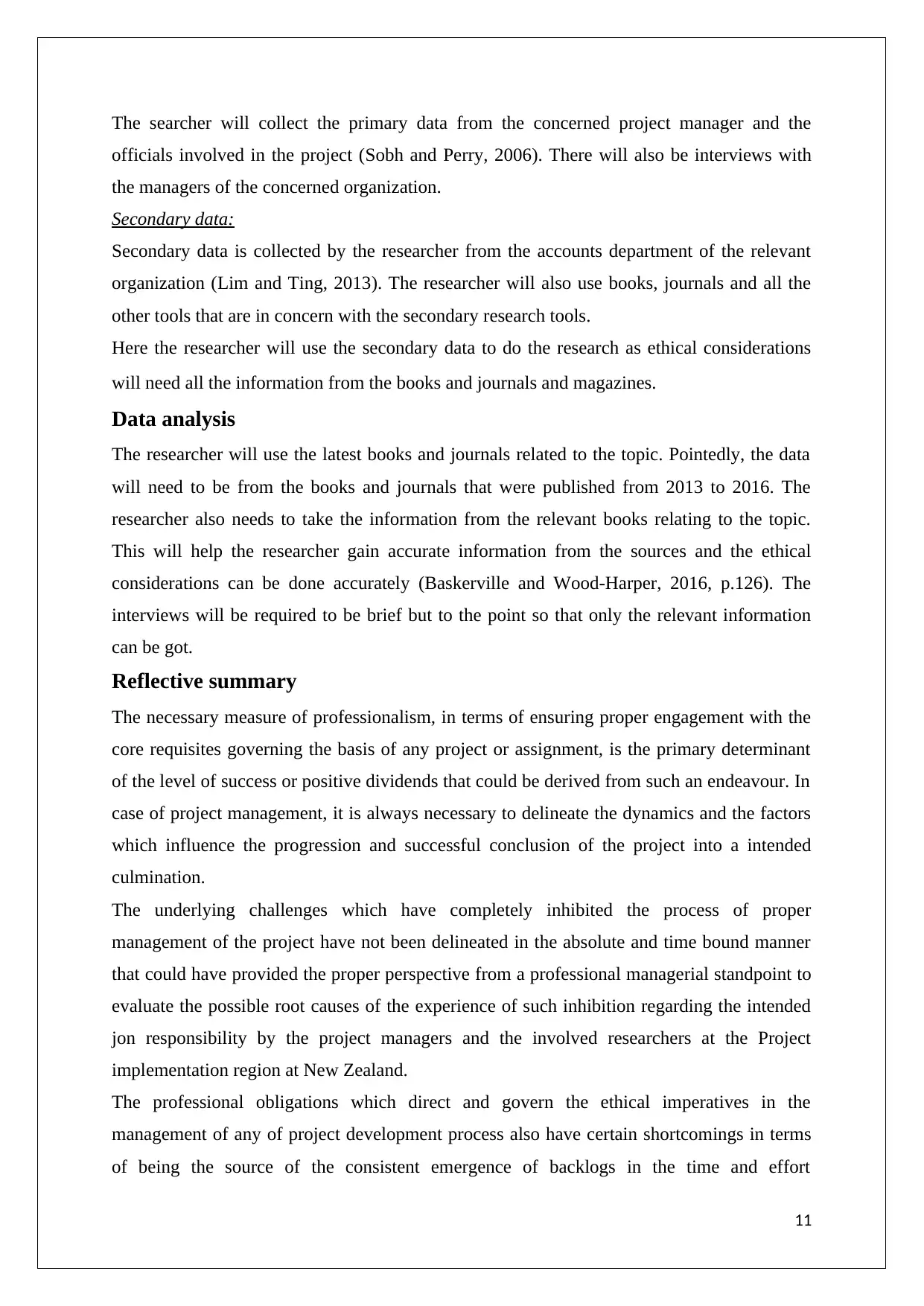
The searcher will collect the primary data from the concerned project manager and the
officials involved in the project (Sobh and Perry, 2006). There will also be interviews with
the managers of the concerned organization.
Secondary data:
Secondary data is collected by the researcher from the accounts department of the relevant
organization (Lim and Ting, 2013). The researcher will also use books, journals and all the
other tools that are in concern with the secondary research tools.
Here the researcher will use the secondary data to do the research as ethical considerations
will need all the information from the books and journals and magazines.
Data analysis
The researcher will use the latest books and journals related to the topic. Pointedly, the data
will need to be from the books and journals that were published from 2013 to 2016. The
researcher also needs to take the information from the relevant books relating to the topic.
This will help the researcher gain accurate information from the sources and the ethical
considerations can be done accurately (Baskerville and Wood-Harper, 2016, p.126). The
interviews will be required to be brief but to the point so that only the relevant information
can be got.
Reflective summary
The necessary measure of professionalism, in terms of ensuring proper engagement with the
core requisites governing the basis of any project or assignment, is the primary determinant
of the level of success or positive dividends that could be derived from such an endeavour. In
case of project management, it is always necessary to delineate the dynamics and the factors
which influence the progression and successful conclusion of the project into a intended
culmination.
The underlying challenges which have completely inhibited the process of proper
management of the project have not been delineated in the absolute and time bound manner
that could have provided the proper perspective from a professional managerial standpoint to
evaluate the possible root causes of the experience of such inhibition regarding the intended
jon responsibility by the project managers and the involved researchers at the Project
implementation region at New Zealand.
The professional obligations which direct and govern the ethical imperatives in the
management of any of project development process also have certain shortcomings in terms
of being the source of the consistent emergence of backlogs in the time and effort
11
officials involved in the project (Sobh and Perry, 2006). There will also be interviews with
the managers of the concerned organization.
Secondary data:
Secondary data is collected by the researcher from the accounts department of the relevant
organization (Lim and Ting, 2013). The researcher will also use books, journals and all the
other tools that are in concern with the secondary research tools.
Here the researcher will use the secondary data to do the research as ethical considerations
will need all the information from the books and journals and magazines.
Data analysis
The researcher will use the latest books and journals related to the topic. Pointedly, the data
will need to be from the books and journals that were published from 2013 to 2016. The
researcher also needs to take the information from the relevant books relating to the topic.
This will help the researcher gain accurate information from the sources and the ethical
considerations can be done accurately (Baskerville and Wood-Harper, 2016, p.126). The
interviews will be required to be brief but to the point so that only the relevant information
can be got.
Reflective summary
The necessary measure of professionalism, in terms of ensuring proper engagement with the
core requisites governing the basis of any project or assignment, is the primary determinant
of the level of success or positive dividends that could be derived from such an endeavour. In
case of project management, it is always necessary to delineate the dynamics and the factors
which influence the progression and successful conclusion of the project into a intended
culmination.
The underlying challenges which have completely inhibited the process of proper
management of the project have not been delineated in the absolute and time bound manner
that could have provided the proper perspective from a professional managerial standpoint to
evaluate the possible root causes of the experience of such inhibition regarding the intended
jon responsibility by the project managers and the involved researchers at the Project
implementation region at New Zealand.
The professional obligations which direct and govern the ethical imperatives in the
management of any of project development process also have certain shortcomings in terms
of being the source of the consistent emergence of backlogs in the time and effort
11
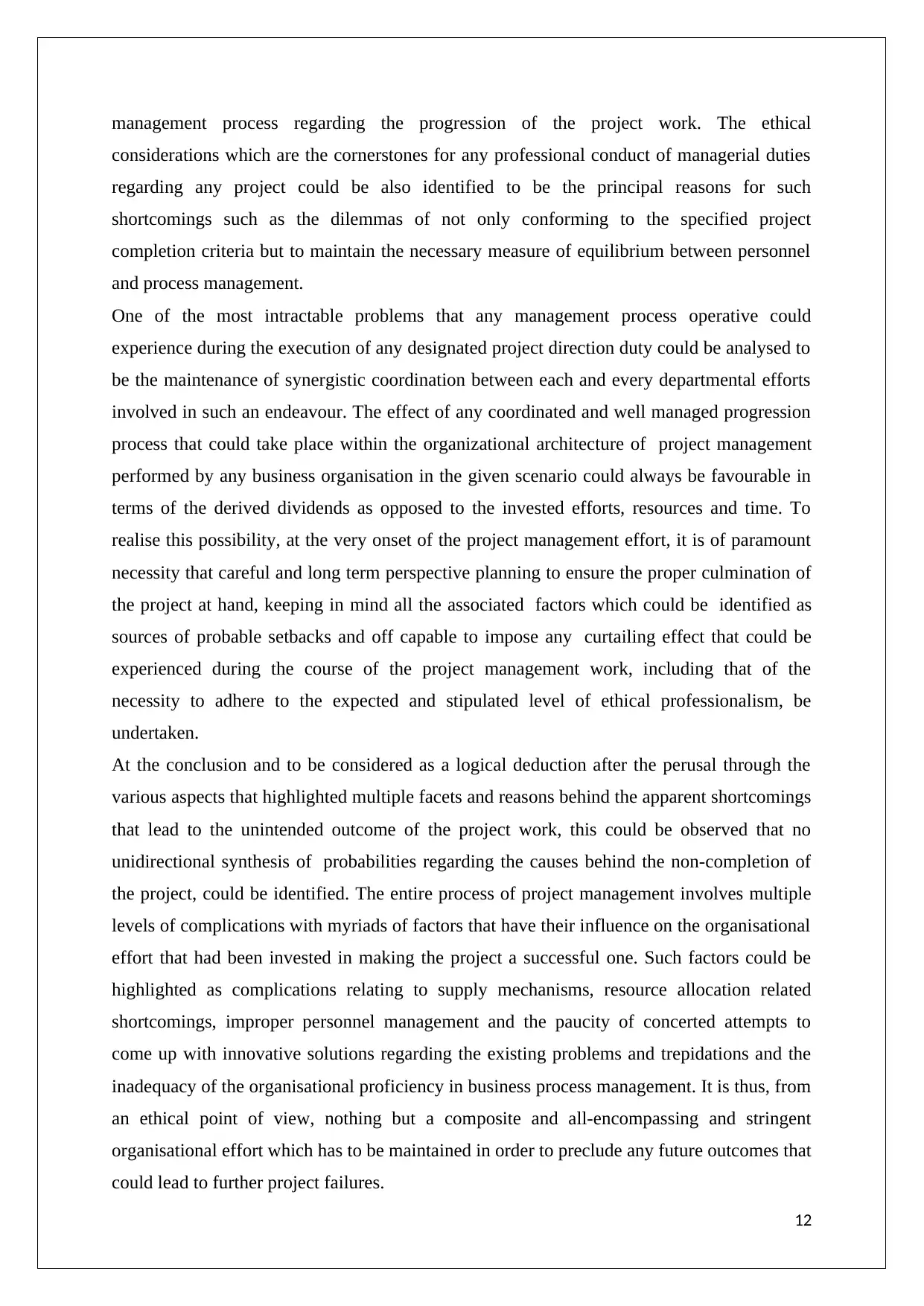
management process regarding the progression of the project work. The ethical
considerations which are the cornerstones for any professional conduct of managerial duties
regarding any project could be also identified to be the principal reasons for such
shortcomings such as the dilemmas of not only conforming to the specified project
completion criteria but to maintain the necessary measure of equilibrium between personnel
and process management.
One of the most intractable problems that any management process operative could
experience during the execution of any designated project direction duty could be analysed to
be the maintenance of synergistic coordination between each and every departmental efforts
involved in such an endeavour. The effect of any coordinated and well managed progression
process that could take place within the organizational architecture of project management
performed by any business organisation in the given scenario could always be favourable in
terms of the derived dividends as opposed to the invested efforts, resources and time. To
realise this possibility, at the very onset of the project management effort, it is of paramount
necessity that careful and long term perspective planning to ensure the proper culmination of
the project at hand, keeping in mind all the associated factors which could be identified as
sources of probable setbacks and off capable to impose any curtailing effect that could be
experienced during the course of the project management work, including that of the
necessity to adhere to the expected and stipulated level of ethical professionalism, be
undertaken.
At the conclusion and to be considered as a logical deduction after the perusal through the
various aspects that highlighted multiple facets and reasons behind the apparent shortcomings
that lead to the unintended outcome of the project work, this could be observed that no
unidirectional synthesis of probabilities regarding the causes behind the non-completion of
the project, could be identified. The entire process of project management involves multiple
levels of complications with myriads of factors that have their influence on the organisational
effort that had been invested in making the project a successful one. Such factors could be
highlighted as complications relating to supply mechanisms, resource allocation related
shortcomings, improper personnel management and the paucity of concerted attempts to
come up with innovative solutions regarding the existing problems and trepidations and the
inadequacy of the organisational proficiency in business process management. It is thus, from
an ethical point of view, nothing but a composite and all-encompassing and stringent
organisational effort which has to be maintained in order to preclude any future outcomes that
could lead to further project failures.
12
considerations which are the cornerstones for any professional conduct of managerial duties
regarding any project could be also identified to be the principal reasons for such
shortcomings such as the dilemmas of not only conforming to the specified project
completion criteria but to maintain the necessary measure of equilibrium between personnel
and process management.
One of the most intractable problems that any management process operative could
experience during the execution of any designated project direction duty could be analysed to
be the maintenance of synergistic coordination between each and every departmental efforts
involved in such an endeavour. The effect of any coordinated and well managed progression
process that could take place within the organizational architecture of project management
performed by any business organisation in the given scenario could always be favourable in
terms of the derived dividends as opposed to the invested efforts, resources and time. To
realise this possibility, at the very onset of the project management effort, it is of paramount
necessity that careful and long term perspective planning to ensure the proper culmination of
the project at hand, keeping in mind all the associated factors which could be identified as
sources of probable setbacks and off capable to impose any curtailing effect that could be
experienced during the course of the project management work, including that of the
necessity to adhere to the expected and stipulated level of ethical professionalism, be
undertaken.
At the conclusion and to be considered as a logical deduction after the perusal through the
various aspects that highlighted multiple facets and reasons behind the apparent shortcomings
that lead to the unintended outcome of the project work, this could be observed that no
unidirectional synthesis of probabilities regarding the causes behind the non-completion of
the project, could be identified. The entire process of project management involves multiple
levels of complications with myriads of factors that have their influence on the organisational
effort that had been invested in making the project a successful one. Such factors could be
highlighted as complications relating to supply mechanisms, resource allocation related
shortcomings, improper personnel management and the paucity of concerted attempts to
come up with innovative solutions regarding the existing problems and trepidations and the
inadequacy of the organisational proficiency in business process management. It is thus, from
an ethical point of view, nothing but a composite and all-encompassing and stringent
organisational effort which has to be maintained in order to preclude any future outcomes that
could lead to further project failures.
12
⊘ This is a preview!⊘
Do you want full access?
Subscribe today to unlock all pages.

Trusted by 1+ million students worldwide
1 out of 14
Related Documents
Your All-in-One AI-Powered Toolkit for Academic Success.
+13062052269
info@desklib.com
Available 24*7 on WhatsApp / Email
![[object Object]](/_next/static/media/star-bottom.7253800d.svg)
Unlock your academic potential
Copyright © 2020–2025 A2Z Services. All Rights Reserved. Developed and managed by ZUCOL.





